#but i think it's just a result of trying to juggle too many plotlines at once
Explore tagged Tumblr posts
Text
At this point I stay exclusively on this website and Ao3 for fandom stuff but DAMN what the hell happened with the reviews
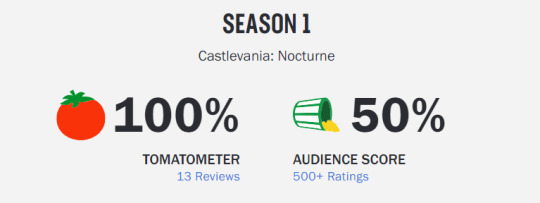
Castlevania Rotten Tomatos below for comparison

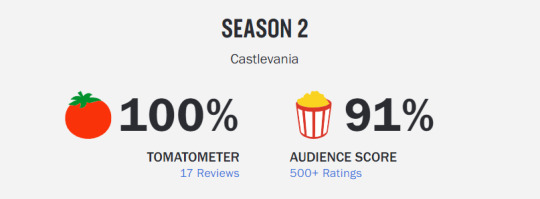
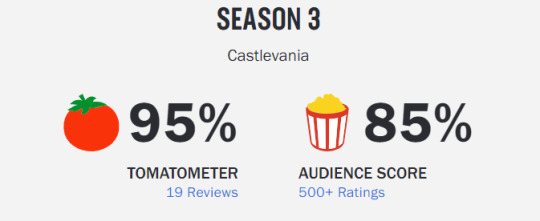
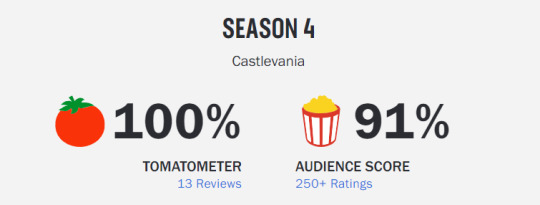
#*long suffering sigh* more than half of these are because of Annette aren't they#people giving this bad reviews because of the annette thing aren't valid sorry not sorry#if you have actual critiques beyond “omg!!!! woke!!!!” you can stay. at least for a little bit#you don't need to like the character rewrites and race changes but if you're basing your reviews and stuff of it then yeah you're racist#oh dear lord there's homophobia popping up too#urgh#this is what i get for looking at rotten tomatoes -_-#people complaining the show talking about the french revolution...bruh#im only paying attention to the few that don't mention “woke” “SJW” or other shit and some (SOME <- key word there) people are valid#LMFAO PEOPLE WITH DARK SKIN EXISTED IN THE 1700S WHAT THE HELL ARE SOME OF THESE PEOPLE ON#some of these reviews are just insulting to fanfic writers#those people have obviously never read a good fanfic in their LIFE#I am willing to tolerate/engage in a polite discussion with some of the people who thought that a few of the themes should have been subtle#i will agree with some of the people who said that richter should have gotten more screen time#but i think it's just a result of trying to juggle too many plotlines at once#oh dear lord this is getting long#ok i'll shut up now#netflix castlevania#castlevania nocturne#castlevania#castlevania netflix#castlevania: nocturne
7 notes
·
View notes
Text
Some early thoughts on Arcane S2
Just a few thoughts on the 1st Act of the new season. No strong commitments or opinions just yet, it's still early on in the story. I'll start with what I especially liked, then cycle into things I'd have liked to see done differently.
Animation
Visually, this season's a step up from the last. I've especially enjoyed the differently-stylized into sequences to each episode (the charcoal-like funeral, the overlords' last supper and the Grey, respectively). I've read some complaints about the music-video-esque treatment of the fights, but I enjoyed that. The music's not my thing, but it fits the steampunk/sci-fi-fantasy aesthetic pretty well.
Vi/Cait
Good to see it become canon! I also like the tragedy they seem to be setting up, and I do like how they wrote their relationship. Again, have read complaints about them getting together and breaking up too quickly, but I think it makes sense - the kiss is a pay-off to almost a season's worth of build-up. The breakup is the result of the gap between the characters' beliefs, conditions and natures. There's always been tension between them, and they're not perfect for each other, so them getting together all at once would not have been believable. Also, since Act 1 sees basically everything uprooted and thrust into chaos, it makes sense for them to make impulsive decisions trying to find comfort. Sure, they're probably not deeply in love, they've known each other for a short time, but they've clearly liked each other for a while. I don't really get where the people that think it's rushed are coming from.
Cait's arc set-up
I really like where it's going! The arc they seem to be setting up looks like it'll be about the effects of grief on perpetuating hatred and violence, which fits right in with the story. I do wonder if they'll attempt to take Cait to the 'extreme' and then bring her back in a sort of redemption arc. It seems like that might be difficult to do after some point. But I'm excited to find out where it's going.
Jinx, Isha and Sevika
Not much to say here, I like how Jinx's family themes continue even after Silco's death. All kinds of nice parallels going on. I like it.
Alright, now for the stuff I'm not so positive on. There's quite a bit, but simply because it is easier to criticize than to praise, especially when S1 has set a very high standard.
Too many plotlines
I've seen people talk about pacing issues, and I do agree, but to me the more fundamental problem (which is the cause of the first) is that this season's juggling too many plotlines. Just the ones that come to mind:
(1) Zaun vs Piltover, undercity uprising (2) Mel and the Black Rose (3) Ambessa's Noxus interference (4) "The Arcane is waking up" (5) Vi, Jinx and Warwick family drama (6) Victor's becoming (7) Vi and Cait relationship drama (8) Singed
My hope is that these will be bettered by uniting some of the plotlines. Victor and the Arcane will probably end up one storyline, same with the Black Rose and Noxus. Still, the story feels over-loaded with STORIES, and not in a very water-tight writing kind of way, but rather in a 'there's too much going on' kind of way. I'm afraid that they will not have enough screentime to set up, develop and pay off all of these, while also doing justice to the character arcs. I might be wrong, we will see.
For now, I feel like they should have cut one of the plotlines above to make more space for the story to breathe. It's also a little thematically messy. There's usually at least a loose thematic connection (family, using magic/science for good/bad, dangers of the arcane, oppression), but sometimes it feels too loose. Again, I'm sure some of this will come with time as we get these 'looser' plots developed, like the Black Rose, Noxus's political interests, etc. Hopefully, they can pay it off right.
A consequence of so much going on is, yes, some moments are not given enough time. This was most evident for me in the Jayce/Viktor goodbye scene. Perhaps it is meant to be underwhelming and this will be relevant later, but as it stands, it's rushed. I've seen someone given another good example, Jayce and Heimer's reunion scene - it should have been tensed with residual conflict, but there's kind of... nothing.
Another consequence is that some characters screentime feels insufficient for their story importance (e.g., Jayce, Viktor, Ekko), while others', excessive (Maddie, the enforcer dudes). Isha's screentime is fine, since she works as a parallel to Powder, and Salo's is also alright because of politics plotline. I've seen some leaks about Maddie which I will not detail here, but I'm not sure that they justify her abundant screentime.
Scale of conflict
I quite dislike the seeming shift away from the core Zaun vs Piltover conflict towards a more 'global' feel. Makes sense for S2 to have a bigger scope, but this is a little too big for my liking. Both the Arcane waking up and the Noxus stuff is very global, and since the show is more about Arcane than about world politics, I would've preferred to have seen the latter cut down in favour of more screentime to the former, as well as main characters from S1.
I also quite dislike the 'let's put aside our political differences to save the world' direction that this all seems to be winding up to, because it kind of puts the more interesting, interpersonal conflict on hold, and takes what I'd consider the 'easy way out' of the moral difficulties of the conflict. I do not know if this is what they will do this season, but it feels like they're edging towards that with the Jayce, Ekko, Heimer and Victor stuff (and possibly the Grey?).
Viktor and Agency
Once again, with so little screentime it's difficult to tell, but the set-up seems to suggest a certain direction here, which I can't say I like. It's unclear whether Viktor is controlled or mind-addled by the Hexcore, but I do dislike the seeming lack of emotion. If he's controlled, it kind of takes away from what S1 was building towards. I do like that Jayce is pushed to use the Hexcore on Viktor (he chooses to do it, despite promising to destroy it), but I feel like the fallout would have been more compelling, especially in terms of Viktor as a character, if he'd seemed more in-control.
They seem to have chosen to go with something else, and I don't doubt they have an idea for his arc, but I wish there'd been more of the original League concept in Arcane's Viktor. As it stands, all the desperation from S1, the anger and helplessness, have sort of... gone, without a good conclusion (I don't really consider Sky's death a good conclusion). Or at least, without one for now. I thought that S1 had been building up to the Machine Herald stuff. Maybe this is an intentional subversion. I've never found Viktor's character to be very compelling, but he was at his best when pushed to desperate measures by his dying body.
This is a matter of personal enjoyment, but I do genuinely hope they bring some emotions back for him, and I really hope he is not controlled by the Hexcore.
#arcane#arcane s2#arcane season 2#arcane league of legends#arcane season two#caitlyn kiramman#jayce talis#league of legends#jinx#thoughts#viktor arcane#caitvi#vi x caitlyn#arcane ekko#vi arcane#arcane 2#jayvik
20 notes
·
View notes
Note
hello! I absolutely adore the political intrigue in CTB, and I'm writing a story inspired (partially) by it, but I'm sorta at a loss for how to come up with plotlines, much less juggle them so expertly like you did. How do you come up with ideas for ur political intrigue? Any tips or methods?
If you write a story that's even partially inspired by CTB, I would like to read it pretty please 👀
The fun part about this ask is that you made me sit down and think to myself: "Wait, how did I come up with the political intrigue???" (That in itself is a lesson about just throwing yourself into projects you think you are under prepared for and going for it with intention.)
To start, I think it helps not to actually think about the story as being strictly political intrigue. When you try to write something within one genre, you get tripped up trying to recreate every element of it. So release yourself from the obligations of trying to produce something that is strictly political intrigue. Once you free yourself from that expectation, coming up with the plot with get easier.
For me, writing political intrigue is less about writing politics and more about writing characters in conflict. Every political position is represented by a person who is active in the plot and has stakes in maintaining their stance. It's not pro-war royalists wanting to wage a hopeless war out of nationalistic militarism against reform war mongerers who recognize that the kingdom can no longer thrive under constant war. It's a story where Zelda feels obligated to wage a war that Warriors wants to stop.
You can see this everywhere. Every stance is spoken for by an actual character, who then get into conflict with other characters. All of these characters have stakes involved with achieving their goals, but not the full means to do so. If someone could strong-arm everyone else to achieve their mission, then there's not much of a plot. There is always something impeding your characters, and it is the goal of every character to find a means around it.
For example, Warriors wants to prevent the Chain from being enlisted. But not only is he being ordered to involve them in the war, but failure to do so will result in him being imprisoned for treason. So he has to find a way to save the Chain without implicating himself.
If you want an extra layer of drama, you can have characters who represent stances that they might not truly believe in. Zelda knows the war is a bad idea, but she feels her hands are tied. That generates even more conflict.
From there, embrace the messiness. If character X does a thing, then it should effect character Y who wants a different thing. Go down that rabbit hole of cause and effect, following the ripples to see where you end up. Let it get a little complicated! Complex webs of cause and effect is one of the biggest draws of the genre.
Whatever you do, just keep an ideal end to your story in mind and a method for your characters to achieve that. That will prevent you from going too far off the deep-end with your ripple effect.
Focusing on character conflict will honestly get you through any type of story, no matter the genre. For political intrigue, making the conflict not only about the world it's happening in but also only solvable through engaging with the politics of that world will be the way to go.
If you're having trouble coming up with the politics part, then you can look no further than the real world. A lot of the way I write Hyrule is based on things that are familiar to real life, such as the extreme nationalism and the loss of rights under martial law.
With so many different groups in the Legend of Zelda series, you already have a good framework for establishing sides of a conflict that you can graft real world politics onto.
One thing I will say is that stories that involve political intrigue often become consumed with the problems of the upper classes (primarily because the upper classes are the ones doing the politics). But at the end of the day, all of the politics will effect the common person the most. So if you can, try to explore what the actual effects of those politics will be. You can see this in CTB with the turncoats, refugee camps, and the mother trying to hide her sons from the draft.
But if you really can't find anything in real life to help inspire the politics of your world, just remember to ask yourself about conflict. What does X want? What is preventing X from getting it? How can X fix things? How does this effect Y, who wants a different goal?
From there, embrace the ripple effect of every character and group trying to solve their problems while causing problems for everyone else.
In conclusion:
Make your character conflict about the politics
Solve your character conflict with politics
Look to real life for ideas as to how political conflict works
Embrace cause and effect
#i couldn't figure out a way to bring this up but also include some mystery elements#at least the part of CTB I'm at now has this central mystery that I'm leaving hints for that Warriors has to solve#though he doesn't know he's in a mystery lol#but yeah just stop getting held up by writing for a genre and just write your story#if it turns out to be political intrigue. great#if it turns out to be something else. also great#when having doubts about any story just focus on the characters#me rambling#lu ctb#ask#shoot-i-messed-up#frankie pretends to know what she's doing#<-making that the tag for when i'm asked for advice
10 notes
·
View notes
Text
mtmte liveblog issue 22
oooh man, its time to feel some EMOTIONS!
I'm BACK after a hiatus, which was due in part to me getting my 1st dose of the covid vaccine! woohoo!
anyways, starting here w/issue 22....we have a great cover w/thunderclash, the legend himself
oof. the covers made me forget how much I don't like the art this issue...I hate to be mean to the artists but this art style just isn't doin it for me chief
god I love this issue though. the framing device of rewind’s movie is so so fantastic
tailgate listing off all his fake awards/accomplishments....ily
rodimus my boy, you're a prime in my heart
the ‘not a decepticon’ label for cyclonus is so much hvbhkjfbskjf
I literally wanna comment on every single panel bc I love all the characters so much but then id be here forever...that being said whirl ily sm
hvbjdfbhsfjhdfshja BRAINSTORM ‘according to perceptor - ships genius’ hvhdkjhbfhjs ily dumb gay idiot
and then the cut to perceptor after brainstorm like, blew up his lab vjbkdsfnbksjf dude
GODDDDDD drift ‘your name...defines you. it’s your soul expressed in syllables. hm? oh, yes, sorry. it’s drift.’ GOD he’s so fucking funny. I love early story hippy drift
god I cant stop thinking about how good this whole issue would be as an animated show...like, specifically rewinds film, it would be SO FUCKING GOOOOOOD mtmte show WHEN
rewiiiiind ;_; I fuckgin love rewind god. fellow video editing enthusiast....
ohhhh rodimus being embarrassed about his big speech at the beginning of mtmte....my boy I love u so much
gjhnbgehjsrkfbjksf magnus being suspicious of rewind oh my god. magnus ily but please, look at the lil guy, he’s a good boy, most of the time
the fuckgin footage that magnus removed hbvhakjbfhskf god. wasn't that intended to be footage of magnus dancing? I love him
minibot squad.....
and here it begins, the mystery stick rung question...
poor rung oh my god he’s just trying to polish his lil spaceship and people r throwing shit at him. taking Ls as per usual it seems
hand grenade tag hvbfjksdnfbkjdf love that callback
noooo rungs ship :(
magnus’s censorship vhbhadkjfhdbhjsakjhfn
oh man I forgot about how they met that race of Transformers But More
the one-upsmanship hbvkajsbehfjks
whirrrrrl lmao I love whirl sm
goddddd whirl just killing that other alien and ending the 16 million yr long civil war bvkjsdbfhjjkafs so fucking much
oh god oh god the ‘are you happy’ page, I'm not emotionally equipped to handle this like, ever
but I will say I feel like it would be EVEN MORE oof if it were milne or someone drawing it bc I feel like this art style takes away from some of the impact bc the expressions aren't really that...expressive? idk how to put it
anyways. every single answer destroys me!!! like even the happy ones, like chromedome and rewind and tailgate - well, in present time, none of those three are doing so hot, so that makes this just hurt
and rung....that is so fucking depressing. jesus. this guy is so fuckng sad, somebody get him a friend stat
and swerve...ouch. this readthru I've really noticed how much early-mtmte swerve is not-so-subtly like, crying out for help bc he’s so alone and shit. jesus
also brainstorms response is just plain ole sad w/context, but at this point in the story without context, it just seems very foreboding lmao. I'm realizing this readthru that brainstorm is very sketchy and ominous in a particular ‘is he evil?’ mad scientist sorta way in early mtmte
and then everyone else is also just so OOF in their own unique sad ways, but I think the worst out of everyone is drift....GODDDDDD. especially considering that at this point in the story, drift is this kinda goofy hippy guy, so seeing him just sit there with his face in his hand, not even answering the question...AND knowing that shortly after this he’ll end up banished...IT FUCKING HURTS M8!
meanwhile, the more upbeat ‘quest to see rungs alt mode’ continues...with an ‘alt mode party’ vhbadkjsdfnabskjf it looks so silly with a bunch of cars just sitting around a table lmao
I cant even tell who everyone is bc they so rarely turn into cars n shit lmaoooooo
rodimus with the bucket on his head hbvhakjbfskjf I CANT
everyone’s reactions to thunderclash...i fucking love it
the fact that TAILGATE doesn't hate him, even though we’ve seen that tailgate tends to dislike people who are universally liked/who have achieved a lot of impressive things
rodimus you petty thot vbdkjbfdjhsakjdf ily
RODIMUS IS SO FUNNYYYYYY ‘I'm not making all these sacrifices and leading these guys into battle and being inspirational - I'm not doing that because it makes me look good’ RODIMUS VBHSKJDFNBKSJF
thunderclash talking about magnus’s article on typefaces....hdbksjfsdbkjgfb bro
AND THEN MAGNUS HUGS HIM....HGBSKJFDSHFKD I CANT
POOR DRIFT bvhajkdfbhjkjsfd rodimus saying he ‘rehabilitated him’ oh my god
the whole spectralism thing...im sorry I cant get over how funny all this is vbakdjfbksjf thunderclash rlly b out here charming rodimus’s entire crew
and then ratchet comes in, calling tc ‘thunders,’ and tc immediately notices ratchets new hands (somehow) hvbkjfhbskjf truly amazing
it cracks me up that rodimus is all 😒😒 at thunderclash, even though as we come to find out, tc really IS That Perfect, and him complimenting rodimus isn't sarcasm at all lmao
AND THEYRE LOOKING FOR THE KNIGHTS OF CYBERTRON TOO HVSDHFJBSHKHDFJS OF COURSE
the vis vitalis being a life support machine spaceship is a really cool concept tho
‘rescuing some orphans from an exploding sun’ I fucking cant
evil guy: [holds a gun to thunderclash’s head]
rodimus: :D finally something doesn't go his way!
he’s so petty I’m..........dkdjhfdabhduifadijgl
and its the aliens from earlier! oooh
GODDD I forgot that swerve used rung in mystery stick mode to SCHWACK the guy
rung casually dropping the fact that the functionists like, experimented on him...there's a lot of implications there, and that'll certainly be explored more later...
the fact that his ID card says ‘rong’ hvbhjakhdsbfakhsjfn
oughufadkfujbsfk the circle of light throwing wrenches n shit at skids...guys cmon vbhsdjkfnslfd
the circle of light is like ‘wtf you all have trauma and a bunch of weird unhealthy coping mechanisms this is wack byeeeee’ lmao
skids calling the lost light his home is rlly sweet tho
cant believe the religious space hippy cult is being so rude about a film made by a guy who died like a week ago. unreal
cd finally figured out how to make the pffft sound, good for him
AUGHHHHH the fact that rewind used ‘little victories’ as the title of the film and that's something that chromedome said in the video ;_; I'm fucking inconsolable
rodimus, despite his obvious posturing for the camera during the whole issue, comes off as surprisingly genuine when he says that he hasn't thought about his own future much, but wants the crew to have a happy ending....im gonna cry
‘who knows what's around the corner?’ tailgate, PLEASE don't say that, oh my god,
OUGHHHH GROUP SHOT
OHHH mannnnNNNNN i love this issue SO MUCH. what a good fun emotional rollercoaster wrap-up to mtmte s1. god.
like, this issue has it all - humor, drama, crippling sadness, intrigue, worldbuilding...it’s so excellent
and getting to see rewind again hurts so bad but also I love him
ok quick mtmte s1 retrospective...god s1 is so fucking good. I'm gonna have to read more to say which chunk of mtmte I liked best but s1 is so fucking excellent that it might be my favorite. though its hard to pick bc there's so much good stuff later on too...whatever, the point is s1 is so so good
the plotlines and characters are fucking stellar. like I cant even believe how well Everything works, its very impressive. I cant really think of anything major that made me go ‘yeah could've done without that plotline/character’
I love how dedicated jro is to connecting everything. I've mentioned it before but basically every single moment in the series has payoff - what you initially think is just a funny moment, or a fluffy character establishment bit, ends up ALSO being an important plot point later, in some way
an example would be here w/rung and his alt mode - it just seems like a fun little B-plot for this issue, and seems to pretty neatly conclude with the reveal that rung was eventually classified as an ‘ornament’ (lmao)...but we later on get to see a lot more about this, both here and in the functionist universe
and like, stuff like tailgate’s autobot lessons w/magnus - at first that can be seen as purely character establishment stuff, showing that magnus is a strict rule-lover and tg is a loveable try-hard good boy - but that becomes plot relevant in remain in light, with tailgate saving the day due to his knowledge of the autobot code (and its also character relevant, with magnus’s arc in remain in light).
and I know this is like. a normal regular thing in writing, but I'm just very impressed about how cleanly jro pulls it off, and how many things he’s juggling at once, especially in early mtmte - it’s very ambitious!
and we gotta remember, this is a comic book. I've read a lot of comic books, and the quality is all over the place. a lot of writers bite off more than they can chew, and the story ends up kinda scattered as a result.
another thing I see a lot in franchise writing like this is a lack of strong early character establishing due to the author assuming the readers are at least somewhat familiar with the characters already - which can be totally fair depending on where it is in the continuity, but other times it can come off as lazy
in mtmte, the cast is extremely well fleshed out, and not only that, the cast itself is unique in that there are a lot of relative unknowns (franchise-wise) - which I think was an absolutely brilliant move, because then jro was able to essentially create The Definitive Version of these characters - characters like swerve, brainstorm, chromedome, rewind, tailgate...mtmte is their baseline characterization, because they haven't really appeared in much else
this also allows for deviation from the franchise norms - again, a comic book classic is good writing being stifled by a need to stick to a certain status quo regard the characters, the world, the powers, relationships, etc
(I've mostly read DC comics, and some marvel, so I'm thinking superheroes w/all these comic comparisons)
so mtmte had a good recipe for genuine creativity in that the characters were relative unknowns, the plot was basically ‘space road trip,’ the status quo of ‘autobot vs decepticon war’ had been demolished throughout the entire franchise...so jro was able to take all that and run, and it turned out so fantastic
and luckily it isn't over yet! so many comics suffer from premature cancellation...and sadly mtmte/ll isn't exempt from this, as we’ll see later, but I've seen some awful ones, where comics are forced to wrap up in like 2 issues while in the middle of an arc. yikes.
but another comic staple...one of my least favorite things about comics books in general...something that was basically responsible for driving me away from comics after reading a bunch...the dreaded crossover event
yep, even mtmte isn't immune to this unfortunate plague on the comic industry. crossover events are the absolute worst, and I'm saying this as somebody who adores crossovers (in concept more than execution usually). they SHOULD be my favorite, but unfortunately they p much always completely suck
they're essentially a ploy to get you to read the other ongoing titles, but they usually only serve to bog down whatever story you're reading to the point where you don't even wanna read that one anymore, let alone read all the other ongoings. at least, that’s been my experience
it doesn't help that reading orders tend to be hard to find/keep track of, and that you need to go read the other series to know what's going on. I just hate it, like, I came here to read THIS series, I don't want a bunch of other series showing up too - even if I was reading two series, I wouldn't want them crossed over, because they're separate stories! augh!
I'm totally losing my focus here but my point is...crossover events suck, and mtmte unfortunately is involved in one. I have not read dark cybertron, and I'm not about to. I've heard nothing but bad things so I have no desire to inflict that upon myself
soooo ill be reading through the tfwiki articles for those issues to give myself a better understanding of what went on - which is more than I've ever done in the past - and maybe ill even make a single post summarizing my thoughts on what I read in the wiki, lmao
but yea ill be skipping to the mtmte s2 stuff next
phew ok I'm super tired, my vision keeps blurring out and stuff lmao. its time for bed, I probably have more thoughts but ill save them for later. for now...peace out!
4 notes
·
View notes
Text
Steven Universe is Anime Garbage (And That’s Okay)
WARNING: This is gonna be a very weebish brain fart. I didn't come into writing it for any purpose, I just decided to write out my general stream of thoughts to see where it took me. This was the result. Thank you, take care out there, and enjoy.
A key to enlightenment is the severance of attachment
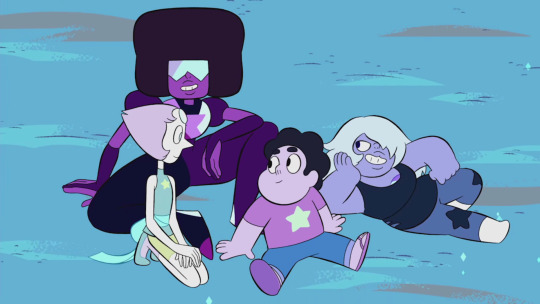
Can’t deny it. Steven Universe is a cartoon practically on the boundary with its many fans. Some find it engaging and wonderful, others find it wasted potential and struggling, and others are terrible fans with no sense of control or integrity, like most fandoms really. But I, a fan since its beginnings, wish to make a case that could potentially bring everything and everyone together in somewhat reasonable understanding (a stretch, somewhat). Steven Universe is a trash anime....and it is the best trash out here. Now I’m not saying this because it has an anime look, or that Jasper is a tsundere, or especially...
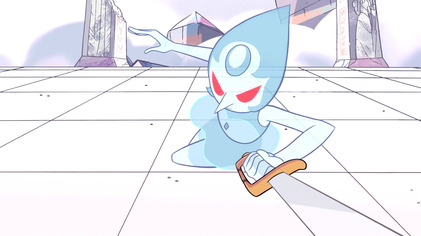
“Hey it’s a reference to that one anime that’s also very aesthetic™ and sad with lesbians and allegories!”
Nah, I’ll be real with you here. Now we really can’t deny that Steven Universe has its major flaws, not a hard pill to swallow way I see it. Wishy washy in tone, seldom in world building, basic animation, off putting character models, and so forth (though the last point is a malleable nitpick tbh). Furthermore, we can’t deny that the “plot” is up in the air and really not in the mood on coming down with anything truly shaking yet (putting a pin in that). But, I won’t deny that it looks good, some characters are worth my investment, and there is some development to be had in all this, for better or for worse. You could say it’s down the middle, so where am I going with this? Well, I think I found something that may be able to bring this together: Sword Art Online
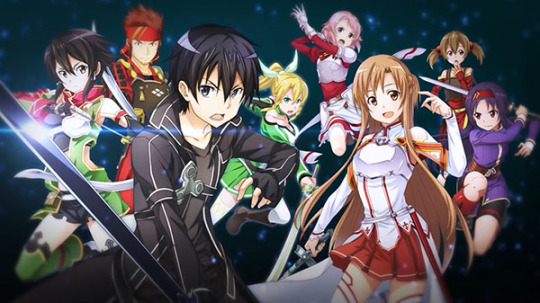
*imitating Austin Powers* YEAH, BABY!
For those unaware, Sword Art Online is a light novel turned RPG Game turned full series anime about thousands of people getting trapped in a VR game with one seeking to escape by beating the 100 levels of the game. It has action, death, good game feel, wonky gameplay, and fanservice.... I do not and will not recommend this to anyone, nor am I just comparing this to Steven U because both have OP protagonists, a myriad of female characters, and how one character is generally Lars if a better person initially. To repeat, I’m not saying these shows are the same in plot and such. Though the similarities certainly come in their perceptions and reactions.
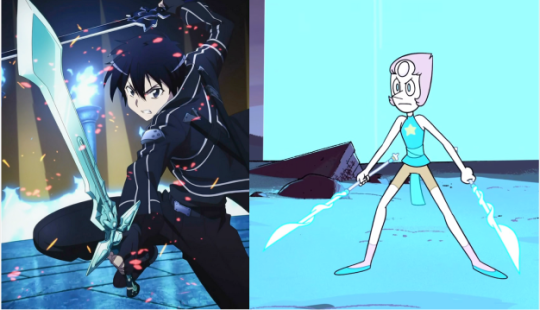
Also dual wielding
Let me sidetrack a bit and do understand, at the time SAO premiered, otakus, anime fans, and even esports fans were hyped! This was before My Hero Academy blew millions away, before Attack on Titan throttled its theme music onto people, many were stoked and kept up that stokeness for this for quite a bit. This was SAO’s keepsake: Mass Appeal and timing. Then people started seeing the cracks of the show’s true faults, and now we’re at the point where more of the franchise is coming and the fandom is dragging between people that find it sucks or never should’ve been invested in the first place, people that continue to make the lemons into lemonade regardless, and the creeps (you know who they are). Sound familiar?
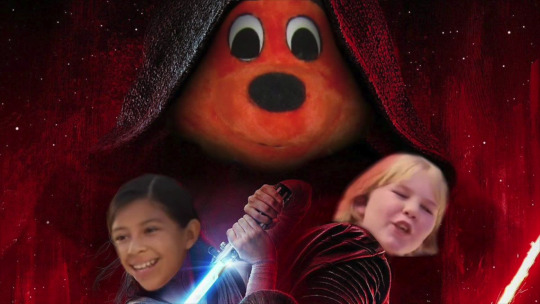
I mean we could say the same thing for the current Star Wars fandom, but that’s a tad more complicated
But this isn’t enough to say this is trash anime. No, like SAO, there is one thing that can tie everything together to implode into an enveloping infinite wormhole of foolishness and cleverness. One moment that just brought everything together and is gonna put everything together in the end. The definitive proof that...
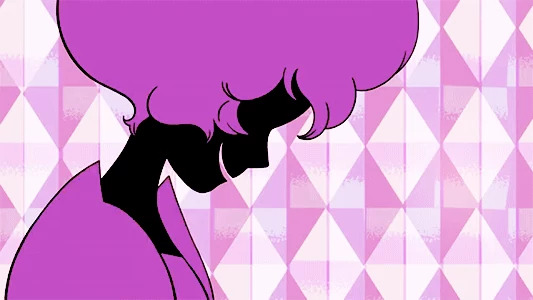
Rose Quartz was the Origami Killer all along!!
But seriously, this was a twist that certainly cemented itself into being on par in writing with SAO and similar trash series. I mean, from a meta perspective, it’s pretty hilarious that the biggest twist the show presented was mostly considered a joke in the same way people thought The Simpsons could predict the future with the absurdist jokes they made. And really, all the symbolism and foreshadowing from every episode previously doesn’t excuse the blue balls I felt with the recent two seasons. I’m sorry guys, the eye opening revelation can go so far with someone who was only glad something actually came together after so long (even if the episode leading up to it lacked that “special shit”).
But as for Pink Diamond being the real Rose Quartz, the twist admittedly lack that impactful-ness and really shows how they’re twanging a string in the efforts to make you take the story seriously. For one thing, it’s pretty stupid to believe that nobody questioned the abilities the one Rose had compared to a typical quartz, not to mention that it felt pretty convenient that she never lost her form revealing her gem to anyone beside Pearl. Secondly, it kinda bait and switches not just the ideal, but a reasonable idea of Rose Quartz for just being the ambitious dictator turned anti-villain bent on liberating the Earth from her bigger than thou parents and more or less her own armada. Like, “Ha ha, you thought Rose Quartz was an ordinary gem that had to make genuine sacrifices in her efforts to best the higher ups and liberate her kind. But in reality, she had the abilities to win all along and generally did everything for the sake of not being a dictator anymore. MWAHAHAHAAAA” We can examine the complexities behind her motivations all we’d like, but that just feels like rewriting the already stupefying concept to make it sound more sensible.

Funny enough, Rose could’ve definitely working as the Charles Xavier of this series but they never delve into that reasonably valuable concept*
Lastly, it sort of--lack of a better term--irons out the whole show up with Steven being Pink Diamond, if that makes sense. In the back of my mind, I’ve generally lost my suspension of disbelief in believing that a fourteen year old child is not only the reformation of a failed rebel leader, but said failed rebel leader actually being the supposed antagonist and jumpstarting source behind everyone’s frustrations, ambitions, and tragedies. As if Steven wasn’t special enough on the fact that he can revive the dead, like Sword Art Online, it’s already apparent that he’ll generally win in the end due to him being the Special, the Ninetail, the Last Jedi, the Hollow, and the Fullbring all in one. It’s kinda hard getting invested in your story when I can’t care about your protagonists! Maybe he might actually suffer long term consequences, but I don’t have much in the future since it now feels hard to relate to the protagonist, who by the way is the central protagonist meaning no episode can go without his presence apparently.

He’ll enter your dreams if he must
And I’m afraid that Steven Universe has officially sunk to trash tier anime. And frankly, it’s always been anchored to this. I mean with SAO, as much as I saw before quitting, there was plot variety, not plot flips. It is one thing to have your series shift from light villain of the week slice of life to something like Oedipus Rex, but to get this far, nose diving into this belly flop of a reveal, to then ask to be taken with a modicum of seriousness, what? To put so much ambition into your work, that you’re essentially believing your own hype, barely exploring a big handful of your own ideas, until now, trying to make sympathy and reason coincide with the villain(s) instead of making them somewhat real. One could say “Monkey, it’s not about taking on villains, it’s about achieving resolve within the group’s personal struggles.” And while that is a reasonable and pathetic way of saying violence can’t resolve things, it doesn’t bear the fact that the Crystal Gems were essentially fighting villains beforehand while achieving resolve, so why change things up now? Especially when the villains before don’t bear any quirk of their own besides being relative to the plot. Or a plot, since again, it wants to be taken seriously with the “story” it has, but juggles way too many things that it can feel hilariously jarring when the show actually gets somewhere.

And as a character drama, the establishment of its world and idealogies don’t feel as valuable when the importance and passion to them are continuously muddled or dull
And this is the way of trash anime. People shouldn’t have to continuously think of how things could’ve been better, why plotlines and characters don’t mesh well, why it can just feel so contrived. Yeah it’s unfortunate that an SU Critical community exists, and yeah sometimes they deserve scrutiny because some try to make it deeper than it is, but we can’t deny that this all appeared from a vacuum. With criticisms can come a consistent string of logic that some things have turned up wrong, something that the series failed to grasp previously. Like SAO, most Shonen works, and “those” shows that I won’t speak of, this series was and has become a glorified gamble on your interests and the anticipation to see where it lands, how cathartic it’ll be, and what’s to look forward to and look back on.... has somewhat slimmed. While it is most certainly its own thing, it doesn’t bear that evolutionary yet timeless nuance Avatar and Adventure Time has, nor the continually captivating hook the best anime can have with its episodes and characters. This series has gotten stupid...and I say it’s not wrong to think that way.

Anime isn’t that big of a mistake, you guys. Come on.
If there’s anything I learned as one of the smartest idiots around, it’s that stupidity can be enjoyable; trust me, I know. So while I say SU’s anime garbage, I’m not saying it’s the bad kind that kills your mood/investment like the shit I found. it’s the Rocket Raccoon of Cartoon Network (and if you’ve seen Guardians 2 and get where I’m coming from, I love you for it). It’s still enjoyable, for the most part, and I’m not gonna ignore the influence it had on its fans. Hell, Black Panther is a movie I find flawed as fuck, but I and the millions (and the millions) still recognize and appreciate it for what it provided, for black people especially. While it can be predictable, there are some good moments to think over, for better or for worse, like how the Rose Quartz was subtly hinted at throughout the seasons. It’s still competent in some aspects, there are a few characters I still love and, to unpin, things look like they’re finally heating up. It still has that “Fuck yeah” spirit buried underneath, like many anime good and trash. It’s certainly better than Star vs th- Point I’m getting at is that this series sure as hell ain’t bulletproof, but I’ll gladly bandage it up and see it through to the end. Not as some guilty pleasure, but as a series that staggers constantly and consistently but makes up in keeping it compelling (in a way). That’s a quality only the best trash anime achieves, shooting itself in the foot while proudly making that run to the finish line. I’m not just blatantly criticizing it or supporting all the hype it makes, I’m embracing it for going this long with this many bruises, willing to take more hits, all the while never really losing sight of what it set out to do. I’ll still smack it upside the head for the stupid shit it might pull, because I know it can and will, but that smack is delivered with love. And really, is that not a reasonable feeling to have?
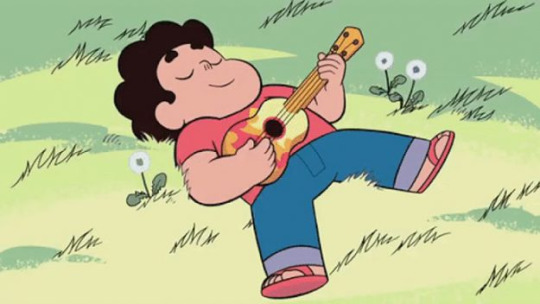
Steven U is anime garbage... and I’m fine with that.
#steven universe#su#su critical#su criticism#rose quartz#pink diamond#cartoons#anime#reviews#analysis#long post#Good Stuff#Roy Macintosh#awesome#brain fart#sword art online
73 notes
·
View notes
Text
FMA 2003 Anime First Runthrough Thoughts
So people saw, in the last few weeks, me liveblogging my first runthrough of the 2003 Fullmetal Alchemist anime. I still have yet to finish the story by watching Conqueror of Shamballa, but before I do so and before I forget to do so, I’m going to post some of my thoughts - more coherently - about the 2003 series.
There are lots of angles I could look at, both pros and cons, and certainly all have points to talk about in length. I’m not going to go into everything now, though. What I’m writing here are some of the biggest first impressions I take from the 2003. Here I’ll mainly write a list of analytical qualifications of how FMA 2003′s storytelling structure differs from Arakawa’s - and consequently how the 2003 anime comes across (to me) as less effective. None of this is in disrespectful criticism of the 2003, which I did end up enjoying enough I’ll potentially do a rewatch (and some episodes I adore so much I actively recommend them to others, too). This is just for me to reflect, in fascination, at how 2003′s different writing choices create some different results and effects.
My response would be better nuanced and FAR more accurate with a second watch through, of course. So don’t take everything I say as a concrete, flawless handling of the topic. We don’t catch everything structurally and informationally the first time watching something, and a story feels different the second time through. However, these are points I take from a first run through regarding (what I feel to be) the odd, limited efficacy of the 2003:
FMA 2003 has an overall grimmer take on reality and achievement. How events unfold and how characters respond in the 2003 show a different level of cynicism versus motivational optimism than in FMAB / the manga. What moral lessons are expounded upon and taken away from has a huge effect on mood. Furthermore, to what extent characters achieve their goals, and feel satisfied with that, and how much characters receive a happy ending... plays into this overall mood difference between 2003 and 2009 / the manga.
FMA 2003′s pacing doesn’t have as much drive. This is due to several factors, like how much time is spent focusing on equivalent materials (ex: one versus two episodes in Liore with Father Cornello), how many filler episodes there are, and how pacing is weighted. FMA 2003 and FMAB have opposite pacing weights. The 2003 anime has a slow start and a faster end, whereas FMAB has a fast jump start but is climax heavy at the end. All of this results in FMAB having a much smoother flow and exciting build, whereas FMA struggles with momentum.
Arakawa is extremely solid for logical clarity, explanations, and follow-through - be it in why events happen in the story, or how clear the story feels to us audience members. Explanations, clarity, and follow-through of various points is more convoluted and inconsistent in the 2003.
So, to talk about it in more detail:
I have downright adored Hiromu Arakawa’s Fullmetal Alchemist storyline for almost a decade now and believe she has captured one of the most brilliant stories ever told. With the 2003 anime, it’s interesting to see creators take material just from the start of her writing and attempt to finish that story separately from her. There are some cool elements to it - the idea of the homunculi being created from failed human transmutation experiments is rather clever, for instance. But there are also some things which make the anime’s story less clean, directed, and powerful as what Arakawa does.
The writers don’t handle explanations and follow-through as well in FMA 2003. By “follow-through” I mean continuing storyline elements forward or using details from past episodes to build material in future episodes. So, if someone completely forgets to follow through on information, then plot threads are left hanging. FMA 2003 doesn’t usually leave threads hanging, but it’s like the story neglects to braid threads together evenly. This results in story threads feeling like a machine spurting on and off, material being less explained, story arcs being awkwardly handled, and the plot as a whole containing more logic holes.
It’s easy to talk about this with some examples. For instance:
Mustang assassinated the Fuhrer in an overt enough manner to be accused, and even if he and Hawkeye had managed to kill all nearby security, reports would have made it to other military personnel. In fact, reports of the event were how Archer got onto the scene to try to halt Mustang. At the LEAST, Roy would be obviously suspected of killing Bradley due to heavy lacerations across his body (plus wouldn’t an ambulance show up at Bradley’s location to take him to the hospital, showing where Mustang was at the time of the event??). And there would be other manners in which Mustang could be put in a position to be incriminated.
Edward said that Mustang could never be a leader again because he couldn’t get people behind him. Bradley himself said Mustang could never again hold a leadership position after assassination. And yet not only does Mustang have no seen dirt on him at the end of the anime, but he retains his high military rank - not even a demotion for disobeying orders, subverting northern troops, and killing the nation’s leader.
(Note: I know he drops in rank in Shamballa, but I hear that’s due to choice, not repercussions of the assassination - by the end of 2003 when he’s recovering, he’s still got his high rank. He gets off clean for literally murdering the country’s most powerful individual).

In fact, you have to wonder how everyone gets off the hook. It’s not like I’d expect them to pin down Havoc specifically impersonated Mustang, but higher-ranking officers like Alex Armstrong led troops to attack Central and that can’t be denied. Why is Alex stepping off free? For all this story focuses on the concept of equivalent exchange and unpleasant consequences, this story sometimes drops odd logic holes on the responsibility front.
Did you even notice Ed accepts Hohenheim as his father at the end... without obviously emotionally working through all the grits of Hohenheim’s backstory and information regarding Philosopher’s Stone creation? There might have been something here to explore the consequences of. It’s like Ed almost accepts his father more effortlessly in London after hearing Hohenheim’s worst side and past... than he does at the start of the story reuniting with Hohenheim.
The truth is that follow-through throughout the anime is uneven. The strangeness of the Elric brothers’ missing father gets hit hard in the starting episodes, gets dropped completely off the radar, then at once cumbersomely, in full force, is relevant again. That plot thread is neither paced nor juggled well. There’s a difference between hitting key moments to progress and build a plotline throughout, versus jumping in and out of the concept to the point it feels sporadically addressed. Many things get turned on and off like light switches. Mustang’s trauma with the past is something that gets hit heavy, dropped, and feels like it’s an on-off light switch several times... until the end where they retroactively discuss some (though not all) of the issue. Even things as major as the Ishvalans’ plight just disappear after Liore. What happens to the Liore refugees upon escaping? With Amestris still being an aggressive military power in a state of widespread racial discrimination, who decides to reverse Ishvalan policies? Why? There is no development, explanation, resolution - just a quick, vague comment at the end of the anime giving an unexplained positive nationwide social turn.

And these sorts of starts and stops and off-balanced jugglings of plots happen all too frequently in 2003. Interweaving of ideas doesn’t feel well-braided... more like a braid with uneven strands, some thin, some fat, some loosely pulled together, some clumps forgotten, some tightly cinched together. Things are connected in FMA 2003, yes, and sometimes in cool ways, but the presentation can be imbalanced.
This sense of uneven content distribution and execution ties into plot pacing.
FMAB starts with unashamed alacrity - not rushed, but nevertheless boldly throwing viewers into the fray. It has a quicker start but focuses on a longass, heavy, high-intensity climax lasting many episodes. Materials build up from the start into increasing stakes for an amazing end. Furthermore, the distribution of episodes in FMAB cleanly follow Arakawa’s three act structure - the East and Central, the North, and the Promised Day arc.
I don’t get the same sense of cleanliness in 2003. Maybe with a rewatch I’ll get the scaffolding, but in a first watch... not so clean. Opposite to FMAB, there is a very slow start, with beginning adventures feeling almost like small, segmented, episodic, low-stakes quests rather than some tension-building gestalt. And the climax, instead of being drawn out and grand for full effect, is proportionally short to the anime - with no time spread for a full denouement either.
So what’s the result? A complete contrast to FMAB. FMAB starts fast and draws out the climax, while FMA 2003 starts slow and shortly squeezes in a climax... which is a great way to stagnate momentum.
And as for the middling section... well. In 2003, there don’t feel to be as cleanly demarcated arcs proportionally. I feel like there is a lot of stop-go motion in the middle, too. Nothing builds to its full capacity and the other events don’t piggyback off well enough to keep momentum flowing throughout. There are a fair number of fillers. The excitement doesn’t vamp up near as much, nor feel as long sustained, nor make one event pull you grippingly into the next as well. Now, it’s true I could feel differently with a second rewatch and catch more of the flow. But I think it’s undeniable that there are different effects between how 2003 and 2009 are scaffolded - and goes to show how 2009 makes the much cleaner, more momentum-building plot building choices.
The 2003 series might also have felt more intense if they had created a greater range of character dynamics. More emotional range is effective, but 2003 doesn’t give us near as full a range as 2009. FMAB both gives us higher, more thrilling heroics... and worse pits of vulnerability.
In 2003 we talk more conceptually about Mustang’s grief over Hughes than show it; he is stable mentally even when he takes his boldest move on that front, assassinating Bradley. And in that scene, we never quite get the feeling “This is for Hughes.” Earlier, when Mustang works to rise his rank (and we barely see any of that), we don’t get much sense “This is for Hughes” either. Frankly, if people didn’t directly say it in dialogue, you almost wouldn’t have known.
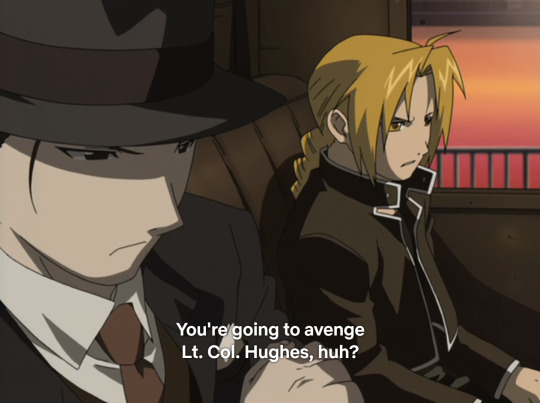
Contrast this with Arakawa’s manga and the 2009 anime, in which something so small as Roy taking initiative (to ask every homunculi if they were Maes’ killer) gives us ongoing, lasting understanding Roy hurts. Then, once Flame of Vengeance and Beyond the Inferno happen, Mustang’s reaction is far, far, far more emotional and vulnerable. He goes to emotional levels 2003 doesn’t give him. We see Roy not just cry at a funeral one time, but here completely break down into a vengeful monster. Arakawa pulls Roy into downright VULNERABILITY and HUGE emotional failings, and because of that, we audience members take away so much more about his care for Hughes. We take away so much more emotion-wise ourselves!
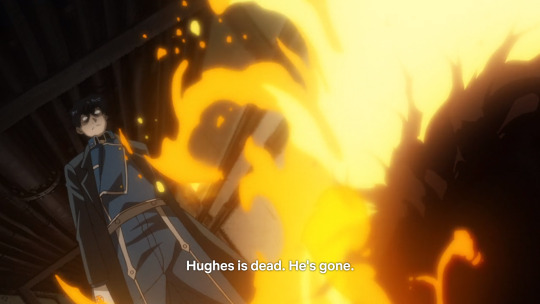
So. We see Mustang at a far more extreme emotional low in 2009. (He breaks down three times in three distinct ways during the Promised Day arc!) AND. We also see him at more extreme moments of greatness. Fighting Bradley is undoubtedly Roy’s best, most dramatic moment in 2003, and while I enjoyed it immensely, there’s something to be said that Roy’s easily more badass in FMAB by episode nineteen. Death of the Undying is a powerful, jaw-dropping, eye-widening, fist-pumping, ultimate badass moment for Roy... and he hasn’t even hit his greatest OP strides. FMAB builds the heroes up to greater, longer, more intense battles that make you root for them and shout. There’s rarely even a single shout out “Yyyeees!!!” moment for our main characters in the 2003. It’s literally not until the last episode I felt any thrill for Roy fighting.
You know how much more emotional and amazing stories are when you give us these greater highs and lows???
And that’s just ONE example. List any character, and you’ll see the same pattern. Which feels more momentous? Ed punching Envy in 2003, or Ed whaling on Father in 2009? Sure, Ed might defeat more homunculi in 2003, but don’t the fights feel so much more epic and victorious in the manga? And which Riza makes you cry more: the woman who makes one (admittedly rather agonizing!) scream for Roy, or the woman who flips out in a gun firing spree when she thinks Roy is dead, guides a blinded Mustang after getting her throat slit, and declares at one point she’ll commit suicide after executing her commanding officer? Riza’s got many more cracks, depth, vulnerability, and badass heroicism in 2009.
Our big moments are bigger in 2009. Our low moments are lower in 2009. Our casualties hurt greater. Our successes feel more monumental. This range of emotion is critical to making story dynamic. Many ideas in 2003 don’t dig out their full potential because they restrict dynamic range. We NEED our characters to be vulnerable. We feel AMAZING when they’re big damn heroes. You walk away with so much more then.

Now, part of the 2003 not having anyone be big damn heroes is because of the grimmer take. Both FMA and FMAB tackle extremely serious topics with depth. But their takeaways are different. 2003 is a lot more about how life has problems; 2009 is a lot more about how life has solutions. Both stories have problems and rewards, but there’s a skewing in how the animes handle each.
For instance, FMA 2003 digs in deep with the Ishvalan people. There is a great amount of content and interesting, nuanced material showing a minority people suffering at the hands of an unsympathetic military state. I appreciate that significantly. The story does a great job calling out the military and questioning the state for their wrong actions. The story does a great job showing what injustices a people group can undergo, and how emotionally they are going to respond to such injustices. In another part of my liveblog, I described the sense of this plot arc as, “The military is shit. They destroyed us. We have the right to be angry. You can argue we have the right to fight back.”
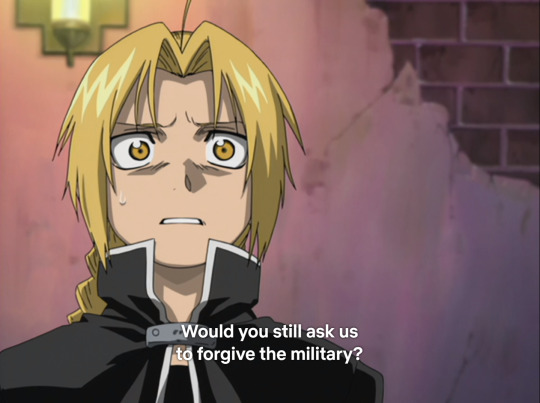
There’s a lot of truth to what 2003 says. It’s a grim concept but quite true in the workings of the world. However, while 2009 also shows us how horrifying Ishval is and how terrible the workings of the world can be, it doesn’t stop at this grim perspective. FMAB also calls out the Amestrians for baselessly killing Ishvalans; Riza points out that even if upper command gave orders and Envy started the war, she and her fellow Amestrians carried out the bloodshed with their own hands. But. FMA 2003 says, “This is bad shit and people can be shit.” FMAB 2009 says, “This is bad shit. We should fix it.”
2009′s message states, “The military is shit. They destroyed us. We have the right to be angry. But that DOESN’T mean we have the right fight back. What we need to do is work to fix the horrors of this work.”
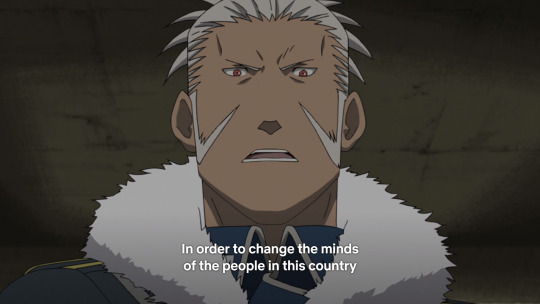
That wraps into one of Arakawa’s biggest, most widespread message throughout all of her manga, from start to end: All humans are important. All souls deserve to be treated with the utmost respect as human beings. It doesn’t matter if you’re a suit in armor. It doesn’t matter if you’re a pig chimera. It doesn’t matter what your race is. It doesn’t matter who started the bloodshed… you should be the one to end it. You are a human, human is good, and the best thing we can do is help each other. FMAB is about breaking out of the cycle of “an eye for an eye.” In 2003, Scar dies carrying out acts against the military. He doesn’t break the cycle. We understand why he responds the way he does, but it’s in 2009 that Scar and his brother become the damndest heroes in FMAB. Scar goes from someone with vengeful purpose for what the military has done to him… to trying to be the better person, the HERO, who fights back and gives back when no one else would before.
In the end, 2009 gives the Ishvalans new hope, too. It’s a lot more balanced in coming, especially as we see characters like Scar work through themselves... changing from a man taking vengeance for Ishval’s destruction, to someone working to rebuild Ishval. The Ishvalans’ return to their homeland is built up with good reason, hope, and moral messages. 2003 shows attention to the grimmer realities in how Scar’s life ends. 2009 gives us the greater perspective of growth and solutions in how Scar’s life moves forward.
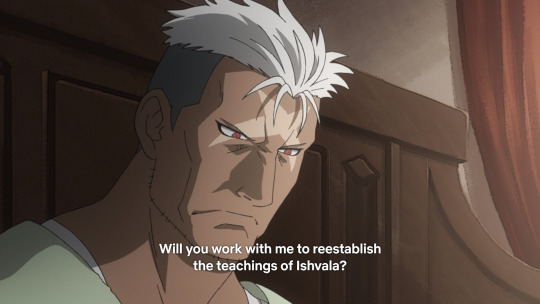
How most characters’ goals are met - or not met - is another series of instances in which 2003 comes out less optimistically. Edward Elric and Roy Mustang have an entire conversation near the end of the 2003 anime about how both of them cannot achieve their goals in the way they initially intended. Mustang planned to rise to Fuhrer by distinguishing himself in military leadership. Ed planned to find his body by working as a State Alchemist. Both of these characters abandon their plans, Mustang commenting, “Both of us are like children, trying to be faithful in living out our dreams.” There’s a good lesson to be learned in this - don’t swallow evil into your plans, but purge it, even if it means stepping away from that initial dream - but it’s also got a lot more of the less pleasant grits of reality to it, than does FMAB in its messages.
For in the end of 2003, Roy Mustang never becomes Fuhrer, is not brought up any further up in military command to seem he could achieve that goal in the future, and is in fact set further behind his goal’s progression because of his injury. He wanted to become Fuhrer “for Hughes,” decided instead to kill Bradley “for Hughes” - but the result is a battle he barely wins, an encounter with Archer that makes him lose an eye, and a scenario in which he collapses unconscious in pools of blood from his injuries. Conqueror of Shamballa may of course change this state, but currently, by the end of FMA 2003, Roy Mustang’s life position is no great momentum forward. There are some good things about what’s become of his choices. He seems to be thankful to have Riza Hawkeye around him as he’s recovering. Still. It’s a more grim reality with grim results.
FMAB and the manga show a more positive future for Mustang. It’s also not ideal, but it’s a more optimistic angle. He’s going to regain his vision - the big injury he sustained during his final encounters with the enemy. Mustang is promoted to Brigadier General fairly quickly after the Promised Day arc. Only a few years down the road from that, he’s the second most powerful man in the country. The final photograph of him at the end of Chapter 108 shows us an esteemed General Mustang. And the way Grumman talks suggests he’ll be giving the Fuhrership to Roy down the road. Instead of Roy throwing away his goal’s hard work because it was imperfect, and instead of finding himself no noticeably further in life by the end of the story, Arakawa gives us a much brighter ending for Mustang.
Even if Conqueror of Shamballa may give Mustang a little bit more of a step forward, how Edward and Al regain their bodies still hits my point hard that how characters achieve their goals, and to what extent, is grittier in the 2003. It’s more imperfect in how life goes down. Al actually uses the Philosopher’s Stone inside him in the 2003; he and Ed sacrifice their well-being for each other to try to help one another; Al returns as a ten-year-old boy with lost memories; he and Ed find themselves in different worlds; and on and on. There are a ton of unideal angles in how Ed and Al return to their initial bodies in the 2003. You’re not celebrating a great, hard-earned victory. It’s CERTAINLYy not the same sort of exciting, fist-pumping achievement we get in FMAB when Ed finds a way to outsmart Truth and carry his brother home, arms wrapped around one another’s shoulders.
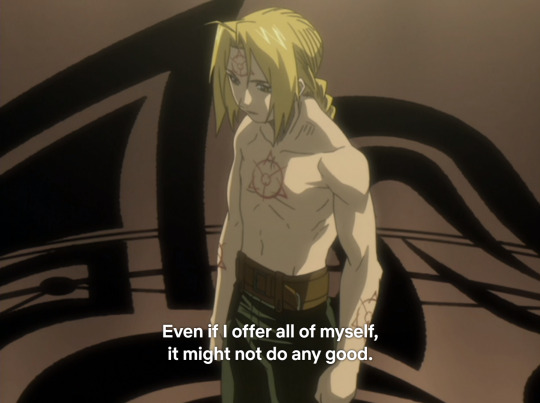
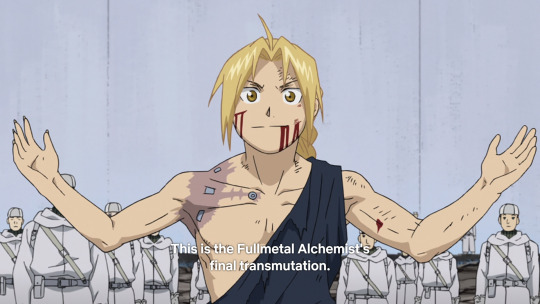
The way I like to phrase the end of FMAB is that most characters achieve 85% of their goal. There are some things that aren’t going to be ideal, and Arakawa acknowledges life isn’t ideal. Al gets Ed’s arm back but Ed will always have an automail leg. Edward Elric has to give up his alchemical abilities to return Al home. Roy Mustang has more years of work ahead of him before he can reach his goal. Ling Yao becomes Emperor, but doesn’t carry home with him an exactly immortal body. Mei Chang doesn’t become Empress, though she earns what she most wished to accomplish: secure the well-being of her clan. Winry, Ed, Al, and Mei all have wonderful relationships to grow through, too. Even though they don’t get every aspect of their goal achieved, that’s okay! It’s still the case that these characters earn through very hard work their own happy endings. These endings are more satisfying, and feel like a greater sense of accomplishment and resolution to their original goals.
2003 moreso undercuts what the characters want. What they achieve and how they achieve it is much less a sense of accomplishment, and focuses even more on the imperfections of the world around them. Ed and Al getting their bodies back isn’t a time to celebrate. It’s just another point in their long journey of trying to figure out how to make their life okay.
And we can continue looking at many more instances to see the pattern 2003 has a less optimistic spin on events. Both stories show imperfections in life, but 2003 hits that sense of imperfection harder and with less payoff to characters. Equivalent exchange and the suffering we endure in life - that’s definitely more positively spun in Arakawa’s tale than the first anime.
Even the ending words of the two anime, while both being similar in their idea, give a sense of the differing levels of focus between imperfection and inspiration:
FMA 2003: Man must pay an equal price in order to obtain anything. That is the Law of Equivalent Exchange. At the time, we believed that to be the true way of the world. But the real world is imperfect, and there was no law that could explain everything. It’s the same with the Law of Equivalent Exchange. Even so, we believe that man cannot obtain anything without paying a price. The pain that we received must have been the price we paid to obtain something. And, by paying the price of effort, everyone will certainly be able to obtain something. Equivalent Exchange is not the law of the world. That’s the promise Brother and I made to each other until the day we meet again.
FMA 2009: There’s no point to lessons that don’t bring with them pain. People can’t gain anything without sacrificing something, after all. But once you’ve successfully endured that pain, you gain a heart that is stout enough not to become overcome by anything. Yeah, a heart made of fullmetal.
Both of these endings acknowledge that we gain something when we go through pain. But in 2003, Al says that the world is imperfect and what he and his brother believed about equivalent exchange was imperfect. Al also is trying to say that he wants to step beyond the imperfect and incomplete Law of Equivalent Exchange and through that find a way to reunite with his brother. There’s a lot more focus on imperfection and the fact that life continues to bring imperfection to him. In the 2009, stating that we gain something through pain is given a more positive spin: once you do that, you can overcome everything. It’s not just that paying the price of pain will gain you a mediocre “something” - it’s that it will turn you into someone with a steel-strong heart that can overcome anything. Mentioning the Law of Equivalent Exchange in FMAB isn’t to talk about how the world is imperfect, but here it’s to say that the experiences we undergo give us a great end result. Hardcomings build our character and give us a happy ending.
There’s certainly a difference in mood between these two closing monologues, similar as they are in conceptual content. FMAB is far more inspirational.
Now. Don’t let this long analysis suggest that I think FMA lacks good quality. There are some extremely cool topics that FMA 2003 discusses in depth, especially regarding our responsibilities in war. And typically I tend to enjoy stories that acknowledge the imperfections of our experiences, and how situations never resolve in the glittery manner we imagine. However, in the case of FMA versus FMAB, I have to say that Arakawa’s story is by far more successfully emotional, satisfying, and inspirational. There has to be some payoff for characters to undergo their challenges. The way FMA 2003 is written, there is less payoff and less inspiration.
These are just some of my thoughts about how FMA 2003 is framed, and how that makes it feel in comparison to FMAB. I’ve had a hoard of fun watching the older series, and I could certainly talk about its positive sides, too. However, I think that’s enough yakking for now. These were my biggest impressions of the series before heading off to Conqueror of Shamballa.
#long post#non-dragons#fma#Fullmetal Alchemist#Fullmetal Alchemist: Brotherhood#FMAB#Fullmetal Alchemist Brotherhood#analysis#my analysis
68 notes
·
View notes
Text
Kingsman: The Golden Circle is a Golden Mess
Kingsman: The Secret Service isn’t even a film I love deeply, but I feel offended for it by the result of its 2017 sequel, Kingsman: The Golden Circle. It’s not that often that you can see so many production issues right up there on the screen, but every few minutes something happens that is clearly the result of actors having other priorities, rewrites, rushed effects, and scenes that were cut for one reason or another.
None of this is to say that the movie is fully incompetent. It begins and ends with some thrilling action scenes, and on the whole is acted very well. There are jokes that land fairly well, as well as some cool ideas like the entire concept of the Statesman. But it is clear that when a sequel for the first film was demanded, writers Jane Goldman and Mathew Vaughn had too many ideas for where to go next. I feel as if they had more time to work on script, entire plotlines like Harry’s (Colin Firth) amnesia would have been refined or cut completely. But as it stands, there is entirely too much going on in this film. The A plot would be stopping Poppy (Julianne Moore) from managing to make all drugs legal across the world, but this is sidelined for an incredible amount of screentime so we can meet the Statesman, recover Harry’s memory, stir up some trouble in Eggsy (Taron Egerton) and Princess Tilde’s (Hannah Alstrom) relationship, begin a sort of relationship between Merlin (Mark Strong) and Ginger Ale (Halle Berry), and see a bizarre subplot involving the President of the United States (Bruce Greenwood) and his Chief of Staff (Emily Watson). These things are all tied vaguely into Poppy’s plot, but distract so much from each other that it really isn’t clear what Vaughn wants us to focus on. Many of these things are either introduced too early and not followed up on in such a matter that we feel it was urgent or important, or they are introduced too late and then resolved far too quickly. And something like Harry’s amnesia subplot has no bearing on much of the movie and seems to only be there so they can repeat a few things from the first movie, such as the drowning test and threatening to shoot a puppy.
If this critique feels like something of a ramble, it’s because that’s all the movie does. It doesn’t space its events in anyway that really makes sense, and as soon as one thing is put into motion five other things are happening. If a movie doesn’t allow its audience to consistently focus on one aspect, then it can very easily become boring, which is exactly what happens here. The first Kingsman has a very streamlined plot, being something of an origin movie with an extended training sequence, and a clear theme of British classicism and anti-elitism. Its sequel is very muddy in what its trying to be about. A dinner scene involving Tilde’s parents makes it seem as if they would be continuing the theme of classicism, but this is the only scene in which it is directly commented on. The idea of recreational drug use across all levels of class and status comes close to making a decent point about the divide between classes being smaller than we initially perceive, but there’s not enough of this in the film to really see if this reading holds any water.
Does it seem like I’ve been forgetting to mention that Channing Tatum is in the movie? Well, I haven’t mentioned him because what is there to mention? He has a thirty second action scene when he is first introduced, and then he is almost immediately put into a coma for the duration of the entire film. It is so clear that he had obligations to other films, and if this were an actor of any lesser caliber he would have been cut out completely. With even less screentime and importance is the great Jeff Bridges, who mumbles out some exposition then pulls a quick vanishing act. The Statesmen were not thought out beyond the initial concept of an American version of the Kingsman and the actors who would play them. There are a lot of things to nitpick about them, such as their code names not making much sense if they’re trying to be a quintessentially American organization (the consumption of alcohol did not originate in the US, Arthurian legend did originate in Great Britain), and it just goes to show you how little time was given to Vaughn and Goldman to establish them and really think out what an American branch of the Kingsman would be like.
It’s also impossible to talk about these movies without talking about their relationship to women and how it treats its female actors. With the first Kingsman ending on what is perhaps the most controversial final scene in a movie in the past ten years, you can bet people would be keeping a close eye on this subject in the sequel. The idea that Eggsy is now fully in a relationship with the subject of that divisive joke from the last movie seems to be a sort of apology for said joke. Unfortunately, that character is given nothing to do besides cry over the idea of Eggsy cheating on her and then become a mute, immobile damsel in distress. Even worse, the cred the first film bought by not making female Kingsman Roxy (Sophie Cookson) Eggsy’s love interest is quickly nullified when she is seemingly killed off in the opening 15 minutes of The Golden Circle. Vaughn tried, and seemingly failed, to argue that the joke at the end of the first Kingsman empowered women. He seems to have tried in this film to make up for it, but failed once again.
Overall, this is a boring movie. It’s not focused enough to keep juggling its superfluous side plots, nor does it contain enough action to say, “Well, at least the action scenes were cool”. It is frustratingly not saying much of anything about the various social, economic, and political issues it raises. There seems to be some set ups for a third Kingsman film, but unless they take their time to really refine a script until it makes basic sense then I won’t be interested.
#kingsman#filmessay#kingsmanthegoldencircle#taron egerton#mark strong#colin firth#julianemoore#channing tatum
3 notes
·
View notes